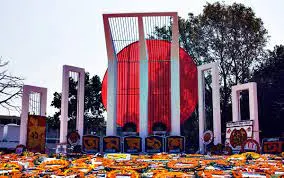Chronicle of 21 February: Bangladesh's Language Movement and Global Recognition
The 21 February is observed with pride in Bangladesh. This day is memorable for the
Language Movement that took place in 1952.
Then, Bangladesh was known as East Pakistan. After the British rule was over/ after the partition of 1947, the Pakistani
rulers declared Urdu as the only state language. Majority of the people of East Pakistan
who spoke Bangla as their Mother language could not accept this declaration and
started protesting. Eventually, the protest turned into a movement with the participation of people from every stage of life.
In 1952, the movement reached its peak. On 21 February of that year, a group led by the
students took out a procession on the roads of Dhaka breaking the curfew imposed by
the ruler and demanding Bangla to be declared one of the state languages of Pakistan.
When the procession reached Dhaka Medical College, police fired bullets at the
peaceful group of protesters. Many had been wounded and many had died including
Salam, Zabbar, Rafiq, Shafiq, Barqat.
This made the whole nation outraged and the
movement became stronger. As a result, the ruler was compelled to declare Bangla
as one of the state languages of Pakistan. After that, 21 February became the National
Martyrs’ Day to commemorate the Language Movement and those who laid down their
lives for the right of their mother language.
The movement was so significant that the whole world acknowledged it. This was
the first incident in world history where people sacrificed their lives for their mother
language rights.
This movement led the nation toward the Liberation War that took
place in 1971. Eventually, the sacrifice of the language warriors was recognized all
over the world.
In 1999, UNESCO has declared this day to be observed worldwide as
the International Mother Language Day to pay respect to all the mother languages and to preserve those. The essence of this day is tied closely to the identities of every nation and the mother languages.



